 Competition Law, Regulation and SMEs in the Asia-Pacific
Competition Law, Regulation and SMEs in the Asia-Pacific Book contents
- Frontmatter
- Contents
- Foreword
- About the Contributors
- 1 Introduction: Making the Invisible SME More Visible in Competition Policy and Law
- Section 1 Theories And Basic Concepts
- 2 Smes, Competition Law, and Economic Growth
- 3 Competition Policy and Sme Policy: Strange Bedfellows?
- 4 The Competitive Experience of Uk Smes: Fair and Unfair
- 5 Competition Regulator Engagement with the Small Business Sector
- 6 Developing Online Competition Law Education Tools for Smes
- Section 2 Smes And Competition Law
- Section 3 Country Studies
- Index
3 - Competition Policy and Sme Policy: Strange Bedfellows?
from Section 1 - Theories And Basic Concepts
Published online by Cambridge University Press: 05 August 2017
- Frontmatter
- Contents
- Foreword
- About the Contributors
- 1 Introduction: Making the Invisible SME More Visible in Competition Policy and Law
- Section 1 Theories And Basic Concepts
- 2 Smes, Competition Law, and Economic Growth
- 3 Competition Policy and Sme Policy: Strange Bedfellows?
- 4 The Competitive Experience of Uk Smes: Fair and Unfair
- 5 Competition Regulator Engagement with the Small Business Sector
- 6 Developing Online Competition Law Education Tools for Smes
- Section 2 Smes And Competition Law
- Section 3 Country Studies
- Index
Summary
“East is east and west is west, never the twain shall meet.”
Rudyard Kipling (1889), The Ballard of East and WestSME (small and medium-sized enterprise) policy seeks to promote small businesses in ways that encourage the pooling of risks, sharing of resources, andnetworking. These activities can, however, sometimes lead to anti-competitive behaviour that competition law seeks to remove. Are the two sets of policies in conflict? This question is explored by using the example of Singapore and the approach taken by the Competition Commission of Singapore.
Policymakers faced with the likelihood of SMEs being unable to adjust to competition law have nevertheless in the past usually opted to apply the law uniformly to all firms. Alternatively, though many competition advocates would frown on it, some policymakers have granted blanket exemptions to SMEs. However, there is a possible middle ground. Singapore's competition regulator defines a clear set of activities that it views as anathema and designates others, the non “hard-core” activities, as deserving different treatment when SMEs are involved.
Introduction
Public policies often have differing objectives. In an ideal world, these different goals would be compatible and complementary, fitting neatly alongside each other; as the oft-misquoted lines from Kipling's poem above prima facie suggests, they would not meet or conflict. In truth, however, Kipling was highlighting the exact opposite, as becomes evident when one reads the whole poem.
The same applies to public policy. The rules, programmes, laws, and assistance made by government, legislatures, and other arms of the state can and often does overlap, and sometimes even conflicts with each other. In this chapter, we explore the potential conflict between two sets of policy: competition and small to medium-sized enterprise (SME) policies. Are they strange bedfellows? And is there a “middle way” in which the two can successfully work alongside each other?
In theory and intent, they both should benefit SMEs. Competition policy seeks as level a playing field as possible in the economy, through the enforcement of competition law and the opening up of sectors in the economy to competitive dynamics.
- Type
- Chapter
- Information
- Competition Law, Regulation and SMEs in the Asia-PacificUnderstanding the Small Business Perspective, pp. 49 - 64Publisher: ISEAS–Yusof Ishak InstitutePrint publication year: 2016
